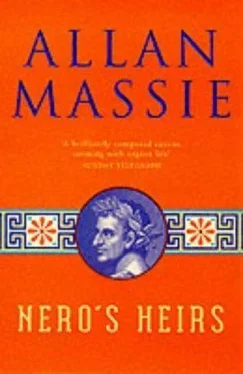Allan Massie - Nero_s Heirs
Здесь есть возможность читать онлайн «Allan Massie - Nero_s Heirs» весь текст электронной книги совершенно бесплатно (целиком полную версию без сокращений). В некоторых случаях можно слушать аудио, скачать через торрент в формате fb2 и присутствует краткое содержание. Жанр: Исторические приключения, на английском языке. Описание произведения, (предисловие) а так же отзывы посетителей доступны на портале библиотеки ЛибКат.
- Название:Nero_s Heirs
- Автор:
- Жанр:
- Год:неизвестен
- ISBN:нет данных
- Рейтинг книги:3 / 5. Голосов: 1
-
Избранное:Добавить в избранное
- Отзывы:
-
Ваша оценка:
- 60
- 1
- 2
- 3
- 4
- 5
Nero_s Heirs: краткое содержание, описание и аннотация
Предлагаем к чтению аннотацию, описание, краткое содержание или предисловие (зависит от того, что написал сам автор книги «Nero_s Heirs»). Если вы не нашли необходимую информацию о книге — напишите в комментариях, мы постараемся отыскать её.
Nero_s Heirs — читать онлайн бесплатно полную книгу (весь текст) целиком
Ниже представлен текст книги, разбитый по страницам. Система сохранения места последней прочитанной страницы, позволяет с удобством читать онлайн бесплатно книгу «Nero_s Heirs», без необходимости каждый раз заново искать на чём Вы остановились. Поставьте закладку, и сможете в любой момент перейти на страницу, на которой закончили чтение.
Интервал:
Закладка:
The Jewish remnant was there commanded by one Eleazar. He was a son of the man who had provoked the rebellion, and had been raised to be a more passionate Zealot than even his father. These Zealots combined an intense devotion to their nameless god with a savagery and austerity such as I had never witnessed, not even the savagery I had seen in Rome, concerning which I cannot yet bring myself to write my account for Tacitus.
This Masada, being built on a rock which rises out of the desert, was fortified by nature beyond the skill of the greatest of engineers. So for a long time we besieged it, but we did not dare to try an assault. The rock was encompassed by valleys so deep that, standing above them, one could scarce discern movement at the bottom. Their walls were sheer, and only two narrow paths wound perilously to the summit. We got ourselves nevertheless to an extremity of the rock which is called the White Promontory, and there built, with great labour, an earthwork…
The boy looked puzzled, for he had no knowledge of siegework; and I saw that the description was superfluous, being meaningless to him. So I said: 'No matter, it is not of our endeavours to take the place that I wish to speak.' And accordingly I leaped ahead of my tale.
'We set fire,' I said, 'to the outer wall of the citadel, by piling burning branches against it. At first the wind blew so as to turn our fire against us, but then, by the kindness of the gods, the wind shifted in our favour, and the fire threatened the defenders. So a breach was made and we retired, ready to attack the following day…
'Now, when Eleazar saw that the place could no longer be defended, he did not surrender, as a civilised man would. Instead he addressed, as we subsequently learned, his people, relating the hardships that had befallen the Jewish nation – though he did not say that these had been provoked by him and his like… Instead, he said, as we learned, and as Josephus recounts in his History:
' "As for those who are dead, we should think them blessed, since they perished in defending the cause of liberty. As for the multitude who have submitted to the Romans, who would not pity their condition, and who would not make haste to die before he was compelled to share their miseries? For some have been put on the rack and tortured with fire and the whips, tortured even unto death. Others have been half-devoured by wild beasts, and yet preserved alive to be more thoroughly devoured in order to make sport for our enemies. And such as are still alive, is not their fate, longing for a death they are denied, the most piteous of all? And where now is Jerusalem the Golden, the city of our fathers, the city to which King David brought the Ark of the Covenant made with Israel? It is now demolished, razed to the ground. The lion and the lizard keep its courts, but the voice of man is silent. Now who is there that revolving these things in his mind, is yet able to bear the light of the sun, though he might live out of danger?"
'So he went on, for a long time, posing questions, and inciting his followers to mingled fury and distress. They gave themselves up to wailing, and their cries cut the night air and made us fearful.
'Then, as we learned later, Eleazar said: "We were born to die, as were those whom we have begotten. Nor is it in the power of the most fortunate of our race to avoid death. But other things -abuse and slavery and the sight of our wives and children led away to ignominy – these are not evils such as are natural and necessary to endure. Only those who prefer such miseries to death, on account of their cowardice, need submit to them. Let us, therefore, while we have swords in our hands die before we are enslaved by our enemies, and let us depart from this world, with our wives and children, in a state of freedom. This indeed is what our laws demand of us, and it is what our wives and children long for also. The Lord himself has brought this necessity upon us, while the Romans desire the contrary, and are afraid lest any of us die before we are in their hands. So, let us go, and instead of affording them the pleasure that they hope to receive by having us in their hateful power, let us leave them an example which shall arouse in them astonishment at our escape and admiration for the courage with which we have embraced our destiny."
When he had finished speaking, there was a deep silence, lasting the time it might take a man to harness a horse. Then the men embraced their wives and children, some of whom wept, while others maintained a calm which any Stoic philosopher would admire, and so, drawing their swords, killed them, either by stabbing them or by cutting their throats. Then they piled the bodies of the dead together surrounded by faggots, and set fire to them. Whereupon, since the Laws of the Jews, unlike those of all civilised nations, forbid suicide, a dozen men were deputed to slay the remainder. Then the twelve cast lots among themselves to see which should take on the task of executioner of his fellows. When two alone were left they engaged in combat, that each might slay the other, and so both avoid the guilt of self-slaughter. And meanwhile the funeral pyre burned.
'In the morning we made ready for the assault, putting our armour on, and nerving ourselves for what was to be a terrible battle, since none doubted the fierce tenacity of the enemy. But then, instead of the noise of preparation, we heard an awful silence, and saw smoke rising from the centre of the citadel. So we advanced hesitantly, and breached or scaled the walls, meeting no opposition, and advanced till we came upon the city of the dead. And when we saw them, we were all amazed, and many terrified.'
I fell silent. The marshlands spread about us, an infinity of waste. A wind blew from the north, not hard but chilling. I sensed the boy pull his cloak more narrowly about him, but I could not look at him to see what effect my words had had. Perhaps, I thought, it is the memory of Masada that denies me sleep at night. But I knew that to be fanciful. I have other crimes on my conscience, and I did nothing at Masada to cause me shame. Yet nowhere have I felt such an expression of contempt for life, such a denial of all that has made Rome what it is. The dead Jews spat in the face of Empire. I have often pondered on that line of Virgil's where he declares Rome's duty to be 'to spare the subject and subdue the proud'. At Masada we were denied the opportunity either to spare or to subdue.
Balthus said: 'How can you know what happened? How can you know what words that Eleazar spoke?' His voice was very low, as if the words were not his, but forced upon him. And yet the question was good.
'There were certain old women, two or three, who either feared or despised death. And so, while Eleazar was speaking, and when they knew the import of his words, they slipped away, and hid in a cellar or, perhaps, a cleft of the rock; and so survived. And they came forward and told us all that had been said and done. When we asked them of the number who had been slain they said it was upwards of nine hundred and fewer than a thousand.'
I could not bring myself to repeat to Balthus, even in this moment of a long-delayed confession which some need – I know not words for it – had dragged from me, the observation of our general, Flavius Silva, Procurator of Judaea and a cousin of Titus: that it was generous of Eleazar to save us the trouble of slaughtering his army. 'Was Eleazar himself among the dead?' Balthus asked.
'It was assumed so, but many bodies had been destroyed or rendered unrecognisable in the flames.'
'Why do you tell me this?' The boy raised his head as he spoke and his cheek was wet with tears. From the village came the crowing of a cock as the first rays of the rising sun touched the grey east with pink.
What had I to reply? There is a line of Ovid's, from a poem composed in these mournful parts: 'To speak of some fatal evil is alleviation.' I shook my head, having no answer in my own mind. Was there cruelty in my forcing on him this story of the atrocious inhumanity of man? Was it because I resented his air of being at peace with the world, despite his condition, that I wished to destroy what I felt as his reproachful innocence? I had denied myself his body, though it tempted me. Did I now, vengefully, wish to assail his mind with horrors?
Читать дальшеИнтервал:
Закладка:
Похожие книги на «Nero_s Heirs»
Представляем Вашему вниманию похожие книги на «Nero_s Heirs» списком для выбора. Мы отобрали схожую по названию и смыслу литературу в надежде предоставить читателям больше вариантов отыскать новые, интересные, ещё непрочитанные произведения.
Обсуждение, отзывы о книге «Nero_s Heirs» и просто собственные мнения читателей. Оставьте ваши комментарии, напишите, что Вы думаете о произведении, его смысле или главных героях. Укажите что конкретно понравилось, а что нет, и почему Вы так считаете.












